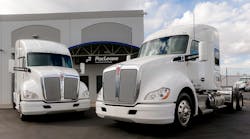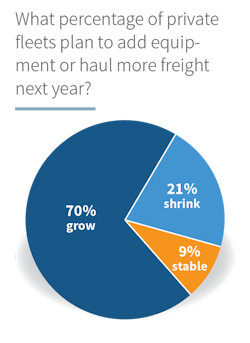What is it about private fleets that retain drivers longer than for-hire carriers?
Drivers tend to stay with private fleets longer than for-hire carriers, where turnover is up to 90% compared to the 15.4% annual turnover rate at private fleets, according to the National Private Truck Council's 2018 Benchmarking Survey Report.
One big reason private fleets can retain drivers longer, according to Gary Petty, NPTC’s president and CEO, is “better jobs.”
The average private fleet trucker annual income of $68,000 (with some drivers making six-figure salaries) is well above the average for-hire-carrier driver’s income of about $45,000 per year, according to the American Trucking Associations.
“Most private fleet drivers are home more often — if not every night or every other night,” Petty said. “So there’s some quality of life dynamic built into the retention of drivers.”
That quality of life also matches up with the better safety scores that private fleets get.
“Private fleets continue to report the highest safety performance in the industry,” Petty said. “Fleets in this year’s study have a DOT Recordable crash rate of just 0.49 crashes per million miles, a slight decrease from last year’s 0.61 accidents per million miles. Most significantly, this crash rate is roughly three times better than the industry average according to FMCSA officials.”
Private fleets have also reported an improvement in preventable and non-preventable accident rates.
When it comes to maintenance, most private fleets do some outsourcing, according to the NPTC study. Just 17% of fleets surveyed conduct nearly all their maintenance themselves, according to NPTC. That amount is down from 23% in 2017.
For the first time in history, more than half of Class 8 vehicles in private fleets are leased, according to NPTC. That is an increase from 2017 when 46% of private fleet’s Class 8 trucks were leased.
“Private fleets need the ability to focus on their business and their customers,” said Todd Berger, director of national accounts for Paccar Leasing (PacLease). “They seek our guidance and support on spec’ing the right equipment for performance, fuel economy, driver attraction and retention. Those kinds of things.”
Truck leasing companies such as PacLease can also offer private fleets new, quality trucks, Berger said. “It is a way that private fleets can attract and retain drivers these days as the industry grapples with a growing driver shortage.”
“We look to go in and understand the customer’s business first and then formulate the best solution that meets their needs — both financially, operationally and culturally,” he said.
About 90% of Paccar Leasing’s customers are private fleets that lease Class 6-8 trucks for five to six years. “We try to keep to a half million miles on Class 8 and 250,000 on medium duty,” Berger said. “We want to ensure uptime for our customers.”
Moreover, a significant trend in trucking, according to Berger, who has worked in the industry since 1982, is that vehicles are becoming less mechanical and more electrical.
“As trucks become more electronic, the fleets that are serviced by mobile mechanics are going to have a more difficult time to maintain the fleets of today and tomorrow,” Berger said, noting that leasing with maintenance agreements can help combat technician troubles.
This move from mechanical to electrical is only going to continue as companies look more into automation and increase safety technologies — most of which are electronic-based.
Tomorrow on FleetOwner.com: What technologies are private fleets seeking and using in their vehicles and more insights from the NPTC 2018 Benchmarking Survey.
What is a private fleet?
The NPTC defines a “private fleet” as a trucking operation conducted under the auspices of a corporation whose primary business purpose is not trucking, but for which trucking plays a critical role. Retail stores, for example, often operate a private fleet to facilitate efficient delivery of products to their outlets; that trucking business serves as a means of enhancing their primary business, providing goods to their customers as efficiently as possible.
NPTC said the most common reasons for operating a private fleet are the following:
- To gain direct control of transportation capacity, via an on-demand basis;
- To control costs, and;
- To provide consistent and high-quality customer service.
Private fleets typically use some mix of owned or leased equipment operated by company or leased drivers, the group explained, and may also have their own for-hire operating authority so they can provide transportation services to external customers to improve fleet efficiencies.
Although the term ‘private fleet’ is often used in a generic sense to describe dedicated fleets or third-party logistics (3PL) services, those are not private fleets. The term ‘dedicated private fleet’ is a misnomer, NPTC stressed, as the trucking services provided to a shipper by an outside carrier or 3PL are generally known as ‘dedicated fleets.’





